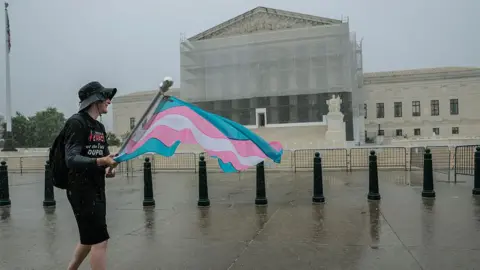 Getty Images
Getty ImagesThe US Supreme Court will allow the Trump administration to require all new passports to indicate a person's biological sex at birth.
The conservative majority court on Thursday froze a lower court ruling in Massachusetts that had prevented the U.S. government from changing its policies while the trial continued.
“Displaying passport holders’ sex at birth does not violate the principles of equal protection any more than indicating their country of birth,” the court said.
On his first day in office, Trump signed a bi-gender executive order that would only issue passports in the U.S. with male or female designations, depending on the gender of the person registered at birth.
The Biden administration has allowed people to self-select their gender on passports and added a third option — X — to travel documents issued by the State Department.
The Trump administration's victory – the latest in a series of emergency Supreme Court cases – means that in the near future people will no longer be able to list their chosen identity on new or renewed passports.
The unsigned order said the government was “simply stating a historical fact without subjecting anyone to differential treatment” with its new policy.
The Supreme Court also said the administration is “likely to succeed on the merits,” indicating that the justices are inclined to issue a final decision that upholds the claim when the case comes before them.
Three liberal justices dissented.
The plaintiffs in the case include transgender activist Ash Lazarus Orr, four other transgender Americans and two non-binary people. They argued that gender restrictions amounted to persecution and could lead to violence against transgender people.
Shortly after Trump issued an executive order requiring gender to be indicated on passports, American actor Hunter Schafer said: she was shocked when she received a new passport that listed her gender as male rather than female, and criticized the policy.
“It doesn’t change anything about me or my transness, but it does make life a little more difficult,” the “Euphoria” star said.
The Supreme Court's decision comes as the Republican president continues to roll back his predecessor's policies on transgender Americans and on diversity, equity and inclusion, or DEI.
The State Department has allowed gender on passports to differ from the sex assigned at birth on medical records since 1992.
In April, a judge in Boston, Massachusetts, said the Trump administration's policies were likely to discriminate on the basis of gender. Judge Julia Kobik, a Biden appointee, said the policy is rooted in “irrational bias” against transgender Americans and violates their equal protection rights under the Fifth Amendment to the U.S. Constitution.
Kobik issued an order in June that blocked enforcement of the policy.
In a dissent Thursday, Supreme Court Justice Ketanji Brown Jackson accused the Supreme Court's six conservative justices of “wantonly avoiding an obvious just outcome,” saying it had become a “failed model.”
“This court has once again paved the way for immediate harm without adequate (or any) justification,” she wrote. “Because I cannot agree with this senseless but painful perversion of our fair discretion, I respectfully dissent.”
Trump's top prosecutor, Attorney General Pam Bondi, celebrated the stay as “the Justice Department's 24th victory on the Supreme Court's emergency docket.”
Secretary of State Marco Rubio called it a “huge victory” for the president and “common sense!”
Over the past few months, the High Court has ruled favorably in the President's favor in similar cases involving gender ideology.
In May, he temporarily allowed the administration enforce the ban on transgender people serving in the militarywhich Trump put into effect by separate executive order.
The administration is also pushing for policies to restrict certain types of health care for minors who identify as transgender and prevent transgender women from participating in women's sports teams.
In August, the Supreme Court also allowed the administration to stop various research grants to the National Institutes of Health related to DEI goals, gender identity and Covid.








